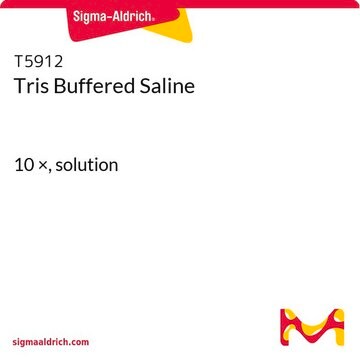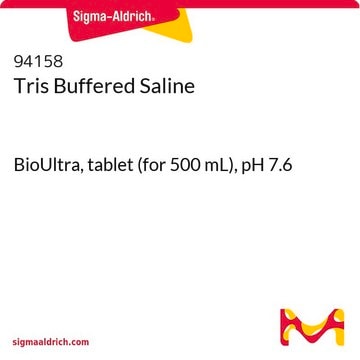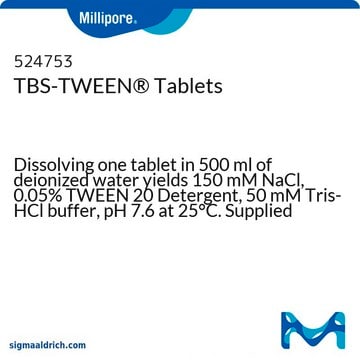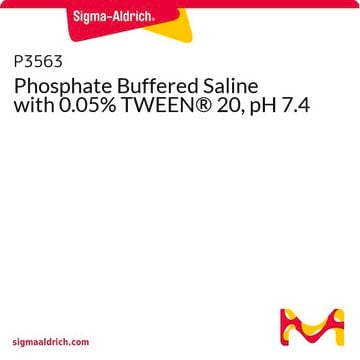91414
Tris buffered saline with Tween® 20
tablet (for 500 mL), pH 7.6, BioUltra, with Tween® 20
Synonym(s):
TBS, TBST
Sign Into View Organizational & Contract Pricing
All Photos(1)
About This Item
UNSPSC Code:
41105319
NACRES:
NA.25
Recommended Products
product name
Tris buffered saline with Tween® 20, BioUltra, tablet (for 500 mL), pH 7.6
product line
BioUltra
form
tablet (for 500 mL)
pH
7.6
solubility
water: 2 tablet/liter, clear, colorless
application(s)
diagnostic assay manufacturing
Application
Trizma is used in the formulation of buffer solutions in the pH range between 7.5 and 8.5. Tris buffer solutions are widely used in cell and molecular biology for processes such as protein and nucleic acid extraction and purification. Tris buffered saline with Tween 20, pH 7.6 is used as a washing buffer in assays such as enzyme-linked immunosorbent assays.
Reconstitution
1 tablet dissolved in 500 mL of deionized water yields:
0.15 M sodium chloride, 0.050 m TRIS-HCl buffer; 0..05% Tween® 20;
pH 7.6 at 25°C
0.15 M sodium chloride, 0.050 m TRIS-HCl buffer; 0..05% Tween® 20;
pH 7.6 at 25°C
Legal Information
TWEEN is a registered trademark of Croda International PLC
Storage Class Code
11 - Combustible Solids
WGK
WGK 1
Flash Point(F)
Not applicable
Flash Point(C)
Not applicable
Personal Protective Equipment
dust mask type N95 (US), Eyeshields, Gloves
Certificates of Analysis (COA)
Search for Certificates of Analysis (COA) by entering the products Lot/Batch Number. Lot and Batch Numbers can be found on a product’s label following the words ‘Lot’ or ‘Batch’.
Already Own This Product?
Find documentation for the products that you have recently purchased in the Document Library.
Customers Also Viewed
T Akimoto et al.
Lupus, 8(9), 761-766 (1999-12-22)
Autoantibodies against prothrombin, including lupus anticoagulant antibodies (LAC), have been identified in patients with systemic lupus erythematosus (SLE) and antiphospholipid syndrome (APS). To identify the epitopes of LAC in patients with SLE and APS, we analyzed B cell epitopes of
Friederike Traunmüller et al.
Journal of immunoassay & immunochemistry, 26(3), 179-188 (2005-07-14)
Immunogenic glycolipids from the cell wall of Mycobacterium tuberculosis are potential capture antigens in enzyme-linked immunosorbent assays (ELISAs) for the serodiagnostis of tuberculosis. Typically, washing steps in ELISAs are performed with buffers containing a detergent. However, Tween-20, the most commonly
Mahmod Panahi et al.
Frontiers in genetics, 11, 1022-1022 (2020-10-27)
Typical cerebral autosomal-dominant arteriopathy with subcortical infarcts and leukoencephalopathy (CADASIL) is caused by mutations in the human NOTCH3 gene. Cerebral autosomal-dominant arteriopathy with subcortical infarcts and leukoencephalopathy is characterized by subcortical ischemic strokes due to severe arteriopathy and fibrotic thickening
Lopa M Das et al.
Autophagy, 15(5), 813-826 (2019-01-22)
Cutaneous inflammation from UV radiation exposure causes epidermal damage, cellular infiltration, and secretion of pro-inflammatory mediators that exacerbate tissue destruction. Recovery is mediated chiefly by anti-inflammatory M2 macrophages that suppress inflammation and augment epidermal regeneration. Vitamin D enables anti-inflammation to
Bernd Zetsche et al.
Cell, 163(3), 759-771 (2015-10-01)
The microbial adaptive immune system CRISPR mediates defense against foreign genetic elements through two classes of RNA-guided nuclease effectors. Class 1 effectors utilize multi-protein complexes, whereas class 2 effectors rely on single-component effector proteins such as the well-characterized Cas9. Here
Our team of scientists has experience in all areas of research including Life Science, Material Science, Chemical Synthesis, Chromatography, Analytical and many others.
Contact Technical Service







![Western Blocking Reagent, Solution solution, sufficient for 10 blots (11921673001 [100 cm2]), sufficient for 60 blots (11921681001 [100 cm2])](/deepweb/assets/sigmaaldrich/product/images/352/091/ef743cea-ccd8-44f1-8f3b-dec5a1e4f5d1/640/ef743cea-ccd8-44f1-8f3b-dec5a1e4f5d1.jpg)
